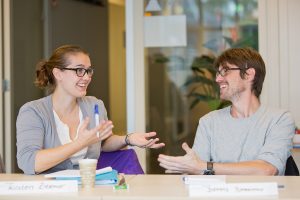
Higher education professionals should be engaged citizens who actively contribute to finding solutions for the challenges faced by contemporary society. To that end, higher education should adopt an open orientation: education that is open to societal, technological and international developments and challenges; and over time, has a positive impact on society in return.
Objectives
- Students are socially engaged with society (by participating in or organising co- or extracurricular activities)
- Graduates are engaged and responsible members of society
- Teachers make relevant connections to societal issues
- Programmes facilitate students’ societal participation
What are the key aspects?
It is important for higher education programmes to establish connections to society in different waysIn the literature, these connections are described in term of their direction, distinguishing between inbound and outbound connections (Walker & Nocon, 2007):
- Inbound connections refer to introducing external elements (e.g., issues, perspectives, objects and actors) into the class, course or programme. For instance, discussing recent issues or having guest speakers illustrate theory-in-practice. Inbound engagement can provide a wider and/or more authentic understanding, contributing to students’ discipline-specific expertise. For instance, by having a mother and a disabled child explain actually in the class, their experience of received and desired care .
- Outbound connections refer to scaffolding the introduction of knowledge, artifacts, people, and their practices outward across university boundaries. For instance, students and/or teachers being and becoming engaged in community projects. Such engagements typically contribute to students’ transferable skills and employability. In order for students to apply their topic and discipline-specific expertise in society, the issues sometimes need to be reformulated and embedded withing the educational setting. Modeling the non-formal or informal societal practice to resemble, match or extend formal educational setting, for instance by including assignments and other teaching strategies.
Since efforts towards engagement with society are time and resource consuming, often seen as “extra”, and typically depend on the initiative and support of specific individuals, it is crucial to consider whether and how the initiatives can become sustainably embedded into courses and programmes.
What are important questions?
- How can students’ interests be addressed in lectures and seminars?
- How can I facilitate student engagement with society, in my classroom? (to follow)
How do you know you are on the right track?
Making progress comprises (re-)designing education as well as keeping track of results. But how can you know that you are making progress? Summarizing the general process of educational design and specific models for curriculum re-design we propose the following three-step approach:
Step 1. Reformulate the (university’s) objectives into questions concerning the current situation (today) and the desired situation in the future
Step 2. Make the answers to the questions measurable
Step 3. Use the answers as input for further (re-)design
For example:
1) How are students engaged with society today and in the future? Examples of measurable answers: by addressing societal issues in (x) courses; by participating in (x) extra-curricular projects; (%) students who volunteers
2) To what extent are graduates engaged and responsible members of society today and in the future? Examples of measurable answers: (%) graduates with position in public sector
3) How do teachers make relevant connections to societal issues today and in the future? Examples of measurable answers: in (x) lectures/group work/assignments; by having (x) guest lectures
4) How do programs facilitate students’ societal participation today and in future? Examples of measurable answers: by having (x) EC reserved for engaging with society; by (x) organising own societal projects.
Example: student project groups
Student project groups (SPGs), part of the minor: Responsible Innovation, offered as MOOC in collaboration with the Erasmus University and the Delft University
Responsible Innovation refers to analysis, reflection and public debate concerning the ethical principles and moral acceptability of new and emerging technologies. In this module, SPGs, mixed groups of 4-6 students coming from the three universities, apply what they have learned to a real-life case of innovation. SPGs are tutored by academic coaches and often collaborate with a company or societal organisation.
Students learn to:
- Present their results to fellow students and coaches and, if feasible, also the target stakeholders;
- Reflect on teamwork and team decision-making processes;
- Apply practical and analytical knowledge to real-life cases.
Example: Leiden Advocacy Project on Plastics
The Leiden Advocacy Project on Plastic (LAPP) is a pro bono initiative concerning legal questions on plastics. The project is part of the Moot Court and Advocacy Department. Within LAPP, students work for non-governmental organisations in a client-lawyer relation. It gives students the opportunity to apply their knowledge of the law to real issues, such as plastic pollution.
Example: Resilient City Hub
In the Resilient City Hub students conduct their MSc thesis research in the context of real world questions on urban resilience and urban metabolism. Students work together intensively with the municipalities of Leiden and The Hague, who provide research questions, supervision, and a working space for our students. This hub is part of the Centre for Sustainability, a centre for research and education at Leiden University, TU Delft, and Erasmus University Rotterdam.
